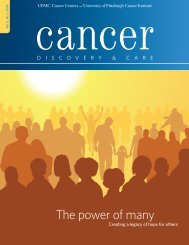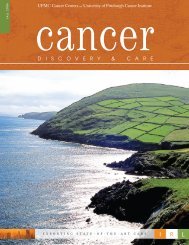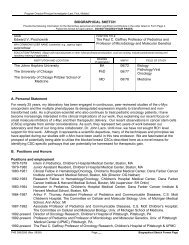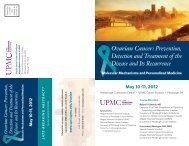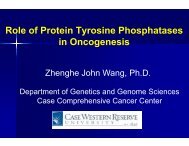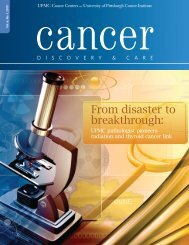D I S C O V E R Y & C A R E - University of Pittsburgh Cancer Institute
D I S C O V E R Y & C A R E - University of Pittsburgh Cancer Institute
D I S C O V E R Y & C A R E - University of Pittsburgh Cancer Institute
Create successful ePaper yourself
Turn your PDF publications into a flip-book with our unique Google optimized e-Paper software.
8<br />
When Dwight Heron, MD, and Keith Morgenlander, MPH, developed a proposal for a grant from the National <strong>Cancer</strong><br />
<strong>Institute</strong> (NCI) to break down the barriers that impede access to radiation services and innovative clinical trials involving<br />
Driven by a personal commitment to the<br />
fundamental right for equality in cancer<br />
care, Dwight Heron, MD, and Keith<br />
Morgenlander, MPH, are leading a fiveyear,<br />
$5 million grant from the National<br />
<strong>Cancer</strong> <strong>Institute</strong> to address racial and<br />
socioeconomic disparities in radiation<br />
therapy in partnership with UPMC<br />
McKeesport. This community hospital,<br />
located southwest <strong>of</strong> <strong>Pittsburgh</strong>, is the<br />
hub <strong>of</strong> the study and one <strong>of</strong> only four<br />
hospitals across the country to receive<br />
the grant this year.<br />
“As a minority myself, I am deeply committed<br />
to changing people’s perceptions<br />
and improving trust between physician and<br />
patient in order to improve access to the<br />
care they deserve,” says Dr. Heron, who is<br />
assistant pr<strong>of</strong>essor <strong>of</strong> radiation oncology<br />
at the <strong>University</strong> <strong>of</strong> <strong>Pittsburgh</strong> School <strong>of</strong><br />
Medicine and vice chairman <strong>of</strong> radiation<br />
oncology at the <strong>University</strong> <strong>of</strong> <strong>Pittsburgh</strong><br />
Medical Center.<br />
Breaking<br />
Down Barriers<br />
Personal experience driving force behind disparities initiative<br />
UPMC <strong>Cancer</strong> Centers<br />
radiation therapy for rural and minority cancer patients, it was more than an academic and intellectual pursuit.<br />
Susan Rafkal, MD,<br />
a UPMC <strong>Cancer</strong><br />
Centers radiation<br />
oncologist, is the<br />
clinical leader <strong>of</strong><br />
the ROCOG grant at<br />
UPMC McKeesport.<br />
“Every day, I see patients who are unable<br />
to take time <strong>of</strong>f work to make it to radiation<br />
therapy appointments or who have family<br />
obligations that keep them from receiving<br />
the care they need to overcome cancer.”<br />
His colleague, Mr. Morgenlander, assistant<br />
pr<strong>of</strong>essor <strong>of</strong> hematology/oncology at the<br />
<strong>University</strong> <strong>of</strong> <strong>Pittsburgh</strong> School <strong>of</strong> Medicine<br />
and coordinator <strong>of</strong> outcomes and disparities<br />
research at <strong>University</strong> <strong>of</strong> <strong>Pittsburgh</strong><br />
<strong>Cancer</strong> <strong>Institute</strong> and UPMC <strong>Cancer</strong> Centers,<br />
is the grandson <strong>of</strong> Russian immigrants<br />
who came to the United States to escape<br />
the pogroms there. Mr. Morgenlander says<br />
that he learned a keen sense <strong>of</strong> social justice<br />
early on from his father, who ran a<br />
child psychology clinic in the Hill District<br />
<strong>of</strong> <strong>Pittsburgh</strong>.<br />
“While disease and hardship can affect<br />
every one <strong>of</strong> us, we are affected differently,”<br />
says Mr. Morgenlander. “Real barriers to<br />
care exist, and studies demonstrate that<br />
the burden <strong>of</strong> cancer is too <strong>of</strong>ten greater<br />
for the poor, ethnic minorities, and the<br />
uninsured.”<br />
Dr. Heron agrees. “A number <strong>of</strong> barriers,<br />
both real and perceived, hinder minorities<br />
and economically disadvantaged populations<br />
from receiving much-needed radiation<br />
services for cancer and from accessing<br />
clinical trials. This NCI grant allows us to<br />
provide radiation services to patients and<br />
communities with the greatest needs and<br />
will help address and overcome geographic,<br />
cultural, and socioeconomic factors that<br />
limit access to these services.”<br />
Statistics from the NCI confirm Dr. Heron’s<br />
and Mr. Morgenlander’s assessment and<br />
indicate that African American men develop<br />
cancer 15 percent more frequently than<br />
white men; many ethnic minorities have<br />
much poorer survival rates than whites.<br />
According to the NCI, much <strong>of</strong> the disparity<br />
in cancer outcome is a reflection <strong>of</strong> type,<br />
timeliness, and continuity <strong>of</strong> care rather<br />
than the disease itself. When patients from<br />
different racial, ethnic, and socioeconomic<br />
groups receive the same quality <strong>of</strong> care,<br />
their outcomes are similar.<br />
Dr. Heron and Mr. Morgenlander are using<br />
the grant from NCI to head up a project,<br />
aptly named the Radiation Oncology<br />
Community Outreach Group (ROCOG), that<br />
consists <strong>of</strong> a consortium <strong>of</strong> five hospitals,<br />
three health systems, several communitybased<br />
organizations, and local health care<br />
providers to improve access and clinical<br />
outcomes for racial and socioeconomically<br />
disadvantaged populations with cancer.<br />
The key goal <strong>of</strong> the grant is to use nontraditional<br />
outreach to make innovative<br />
clinical research studies, including radiation<br />
therapy, available to underserved<br />
populations, specifically the economically<br />
disadvantaged as well as African American<br />
minority populations.<br />
“What makes this grant most unusual is<br />
that it includes academic and communitybased<br />
hospitals, local and national partners,<br />
and community and faith-based groups,”<br />
says Mr. Morgenlander. “We focused on<br />
the patients’ needs and put the control <strong>of</strong><br />
the project as close to the community and<br />
patient as possible.”<br />
According to Dr. Heron and Mr. Morgenlander,<br />
one <strong>of</strong> the most unique projects within the<br />
grant is a rural transportation program to<br />
bring patients into appointments and to<br />
house elderly and disabled patients.<br />
“Women with breast cancer are four times<br />
more likely to have a radical mastectomy<br />
than breast-conserving surgery when they<br />
can’t physically make it to appointments<br />
for radiation treatment,” Dr. Heron says.<br />
“If we can provide something as basic as<br />
transportation, we can significantly improve<br />
recovery time and quality <strong>of</strong> life for these<br />
patients.”<br />
Dwight Heron, MD, and<br />
Keith Morgenlander, MPH,<br />
have joined forces to<br />
break down racial and<br />
socioeconomic disparities<br />
in cancer care, specifically<br />
radiation therapy.<br />
Other examples <strong>of</strong> innovations within the<br />
grant include creating a neighborhoodbased<br />
cancer survivor buddy system,<br />
assisting with child or senior care during<br />
treatment, developing a telemedicine system<br />
to provide real-time care consultation<br />
with local, national, and international<br />
experts at other centers, and creating a<br />
comprehensive quality assurance and<br />
improvement system to ensure the quality<br />
<strong>of</strong> care and to monitor treatment disparities.<br />
ROCOG, based at UPMC McKeesport,<br />
includes Jameson Hospital in New Castle,<br />
Pa.; Mercy Hospital in <strong>Pittsburgh</strong>; Somerset<br />
Hospital in Somerset, Pa.; Allegheny <strong>Cancer</strong><br />
<strong>Institute</strong> at Somerset; and UPMC Lee<br />
Regional and UPMC <strong>Cancer</strong> Center, John P.<br />
Murtha Pavilion, both in Johnstown, Pa.<br />
The <strong>University</strong> <strong>of</strong> <strong>Pittsburgh</strong> <strong>Cancer</strong> <strong>Institute</strong>,<br />
Allegheny <strong>Cancer</strong> <strong>Institute</strong>, and the National<br />
Adjuvant Surgical Breast & Bowel Project<br />
provide locally-based academic support<br />
while two additional cancer centers, Roswell<br />
Park <strong>Cancer</strong> <strong>Institute</strong> in Buffalo, N.Y., and<br />
the Mallinckrodt <strong>Institute</strong> <strong>of</strong> Radiology at the<br />
Washington <strong>University</strong> School <strong>of</strong> Medicine<br />
in St. Louis, act as mentors in the project to<br />
advise in the design <strong>of</strong> ongoing clinical programs<br />
and community outreach efforts.<br />
Other partnerships with key community<br />
and faith-based organizations include the<br />
Consumer Health Coalition <strong>of</strong> Greater<br />
<strong>Pittsburgh</strong>, the Center for Healthy Hearts<br />
and Souls, and the <strong>University</strong> <strong>of</strong> <strong>Pittsburgh</strong><br />
Graduate School <strong>of</strong> Public Health’s Center<br />
for Minority Health. ■<br />
“We focused on the patients’needs and<br />
put the control <strong>of</strong> the project as close<br />
to the community and patient as possible.<br />
<strong>University</strong> <strong>of</strong> <strong>Pittsburgh</strong> <strong>Cancer</strong> <strong>Institute</strong><br />
9


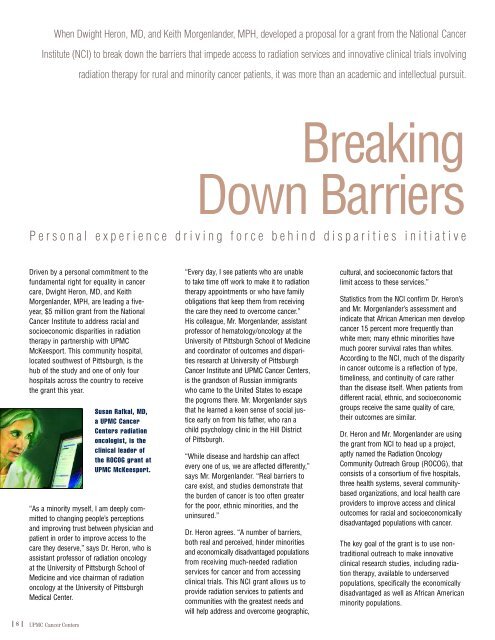
![Rodent Bedding technical info and Beddinig biblio[3] - University of ...](https://img.yumpu.com/51540189/1/190x245/rodent-bedding-technical-info-and-beddinig-biblio3-university-of-.jpg?quality=85)
